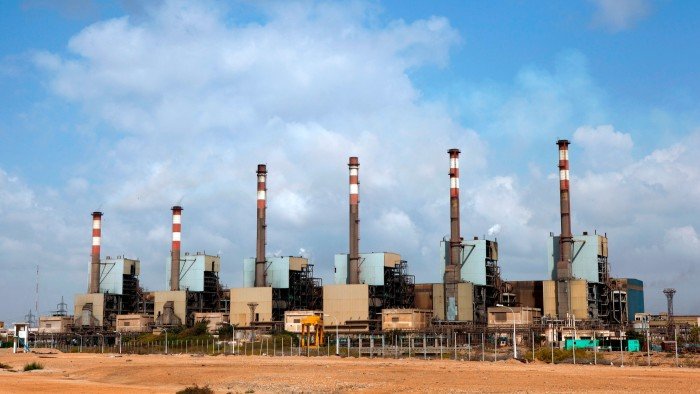Unlock the Editor’s Digest for free
Roula Khalaf, Editor of the FT, selects her favourite stories in this weekly newsletter.
Saudi Arabian and Pakistani investors are battling for control of one of Pakistan’s biggest power companies, a fight that threatens to derail not just reform of K-Electric but also Saudi investment in a country that desperately needs it.
Al Jomaih Power, a Saudi company that with Kuwaiti fund Denham Investment bought a stake in K-Electric during its privatisation in 2005, is pitted against Shaheryar Chishty and his company AsiaPak Investments, which bought a stake three years ago from the liquidator for collapsed private equity group Abraaj.
The Gulf investors want to block Chishty and his allies from taking board seats, according to Cayman court documents seen by the Financial Times, claiming the sale by the liquidator violated a pre-existing shareholder agreement and Pakistani disclosure and security clearance rules.
The row threatens K-Electric’s ability to pull off a $2bn reform plan, according to executives, shareholders and analysts. Authorities in Pakistan are particularly concerned at a time when they are keen on more investment from the Gulf. A powerful military-led investment vehicle, set up to attract Gulf investment, is pressing for a swift resolution.
Sarfaraz Ahmed, a lieutenant general and national co-ordinator for the Special Investment Facilitation Council, had discussed with both sides a potential sale of their stake, said three people on or close to members of K-Electric’s board of directors.
“SIFC told me, ‘this is a shareholder issue, [so] not our problem.’ But they also said to sort it out,” said Shan Ashary, who represents Al Jomaih on K-Electric’s board. “Saudi authorities are aware of long-standing issues [at the company] . . . they are watching closely as it impacts Saudi investor sentiment.”
The “government and army are both concerned”, said a person familiar with AsiaPak’s thinking.
The dispute began in 2022, when Chishty, a former banker in Hong Kong, became the largest limited partner in a fund that holds a majority stake in KES Power, a Cayman Islands-based fund that owns 66.4 per cent of K-Electric.
Al Jomaih, which along with Denham is a major partner in KES Power, sought and received a stay order prohibiting changes to K-Electric’s board. With the term of the current board due to expire in the second half of this year, the company has been unable to appoint new board members.
“The Gulf investors have big egos and lots of clout in Pakistan,” said a person close to the Al Jomaih family and familiar with their thinking on the matter. “The sheikh [Sheikh Abdulaziz Hamad Aljomaih] is very clear — he says if it takes 100 years to get these cases done, we will do it,” the person said.
Chishty and his allies have said in court documents that Al Jomaih and Denham were in violation of the shareholder agreement themselves by continuing proceedings in Pakistan despite a Cayman court ruling establishing exclusive jurisdiction in the islands. They also said it was “highly inappropriate” to suggest their acquisition was non-transparent.
The dispute speaks more broadly to the fraught attempts at privatisation of a sector that is key to Pakistan’s development.
Private equity group Abraaj, which made an investment of $360mn in 2008, halved transmission and distribution losses to 15.3 per cent, helping power generation keep up with the demands of Karachi’s ballooning population.
But then “Abraaj went belly up, and now there’s no clear ownership”, said Ammar Habib Khan, an assistant professor at the Karachi-based Institute for Business Administration. “K-Electric has become the antithesis of privatisation, which was supposed to improve governance and efficiency, but in this case we are stuck at an impasse.”
Shareholders and executives said the dispute threatened efforts to raise the $2bn needed to scale up renewable energy capacity and bring down transmission and distribution losses.
“If [the] shareholder issue remains unresolved, international financing will be a challenge,” said Ashary.
Chishty told the FT: “No one wants to invest in a company with no plan.”
Imran Rana, K-Electric’s spokesperson, said “the company categorically rejects” allegations that the shareholder litigation and three board vacancies were affecting the utility’s core business.
Since the 2022 stay order, K-Electric’s existing board has approved plans for the $2bn transmission and distribution overhaul and a new generation tariff, which was approved by Pakistan’s electricity regulator in October, he said.
The SIFC and Saudi Arabia-based Al Jomaih Holding Company did not reply to requests for comment.
“Lawsuits aren’t going to be the answer, but there do appear to be irreconcilable differences. One side has to buy the other out,” said the person familiar with AsiaPak’s thinking.
